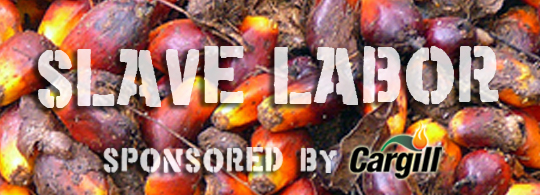Did you know that palm oil—a pervasive vegetable oil widely known for its disastrous effect on rainforests—is found in about half of the goods at your local grocery store? Palm oil is now also linked to slave labor. You can thank Cargill for that.
Cargill is the largest importer of palm oil into the US, supplying most food companies in America. Last week, Rainforest Action Network uncovered an alarming connection linking Cargill’s palm oil imports to slave labor on the island of Borneo.

Here’s the scoop. Kuala Lumpur Kepong (KLK)—one of Malaysia’s largest palm oil plantation companies—is the company that I criticized back in my November 2010 blog post with documented testimonials of two palm oil plantation workers who’d encountered 21st century slave labor conditions on the plantations of a KLK subsidiary. The two villagers from Northern Sumatra were lured by representatives of a KLK subsidiary to work in the company’s palm plantations, only to be forced into slave labor conditions for months until they could escape without being paid.
Just last week we confirmed that KLK supplies palm oil to Cargill. Customs data shows that Cargill imported at least 14 shipments of palm oil — totaling at least 10,000 tons — from Kepong Edible Oils (a fully owned subsidiary of KLK) between October 2008 and March 2011.
As we stated in our press release:
Cargill is buying its oil from companies connected to some of the very worst examples of corporate environmental destruction and human rights abuses. This is yet another of many examples RAN has identified in our three years of campaigning on Cargill that demonstrates the immediate need for the company to adopt a comprehensive palm oil policy.
Until Cargill adopts the following basic safeguards, the company can’t guarantee to American consumers that slave labor is not ending up in their food:
SOCIAL SAFEGUARDS – A commitment to resolve social and land rights tenure conflicts, a no-trade position for growers using child or slave labor, adherence to obtaining free, prior, and informed consent (FPIC) of forest-dependent communities before lands are acquired or developed, and a commitment to implement the United Nations “protect, respect and remedy” framework for human rights.*
ENVIRONMENTAL SAFEGUARDS – A commitment to reduce biodiversity loss and greenhouse gas emissions by ending the expansion of palm oil plantations into High Conservation Value (HCV) areas including critical habitat, peatlands and High Carbon Stock forests and/or remaining natural forests.
PUBLIC TRANSPARENCY – A commitment to transparent and consistent reporting of metrics and targets as well as regular stakeholder and rights-holder engagement.
As if being implicated in slave labor wasn’t enough damage for Cargill’s brand in one week, the Environmental Investigation Agency (EIA) and its Indonesia partner, Telapak, recently exposed a juicy scandal that implicates Cargill in a dirty mess of illegal logging through its ties to the same company—KLK.
The evidence provided by EIA and Telapak proves that KLK cleared carbon-rich peat forest in Indonesia’s Central Kalimantan province illegally as the company failed to secure proper licenses. This scandal was documented on the very first day of Indonesia’s logging moratorium — a cornerstone of Norway’s $1 billion climate deal with Indonesia. According to the report, the Norwegian Government has a $41.5 million shareholding in KLK, thereby standing to profit from the company’s recently exposed illegal clearance.
TAKE ACTION
Ask Cargill to adopt basic supply chain safeguards to prevent palm oil that causes rainforest destruction and human rights violations from tainting America’s food supply.
**A commitment to implement the United Nations “protect, respect and remedy framework” over civil and political, social, economic, cultural and environmental rights of affected communities and vulnerable groups of indigenous peoples, migrant workers, women and children. – Human Right Council, March 2011. Guiding Principles on Business and Human Rights: Implementing the United Nations “Protect, Respect and Remedy” Framework